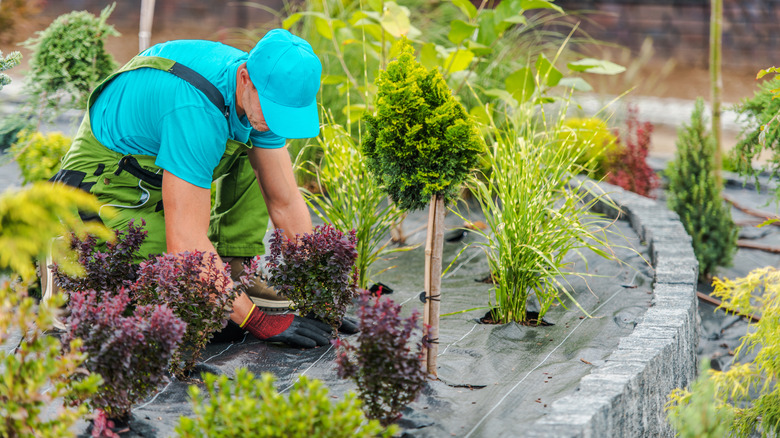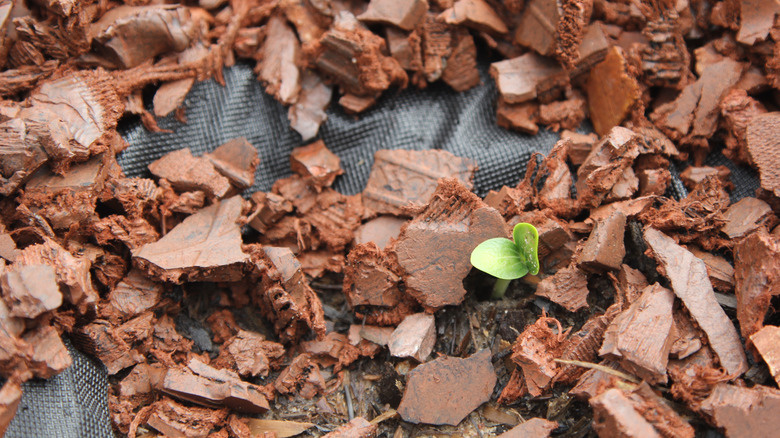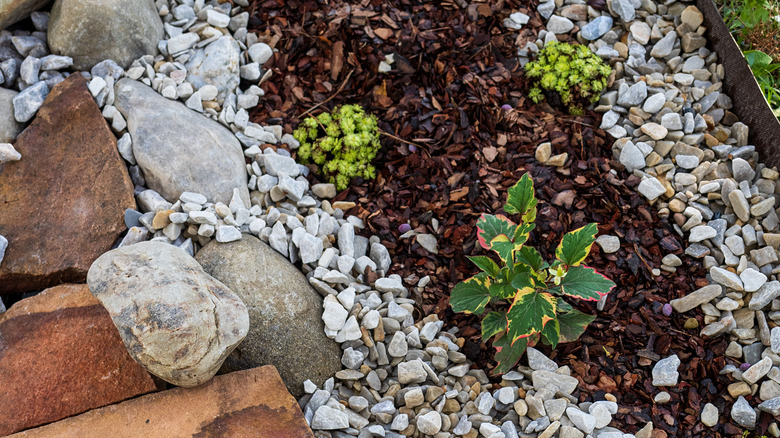The Worst Mulch For Your Flower Bed And What To Use Instead
We are spoiled for choice when it comes to the types of mulch available at most garden centers. The problem with having so many options is that it's hard to know what's best for specific situations. In addition to what you can get from the store, you might even be able to score free mulch from your city or sawdust from a local woodworker. There are pros and cons to most mulch options, but as a master gardener that's passionate about the health of my plants, one I'd never recommend using in flower beds is rubber mulch. Natural rocks and wood mulch are better options, depending on your specific needs.
The majority of rubber mulch is made from ground-up tires, promoted as a good choice because it won't decompose, is available in many colors, and doesn't float away. While those first two claims are true, the last is dependent on where you use it. As someone who lives in a region that experiences everything from extreme drought to frequent flash flood warnings, I can tell you that any mulch will float if it rains hard enough! True versus false claims aside, there are some serious reasons to reconsider using rubber mulch in your flower bed.
Why you should avoid rubber mulch
Rubber mulch is tempting to use because it's inexpensive for what would be considered a "forever mulch," which you would never have to replace. While I love the concept of turning old tires into a useful product that will never decompose, the same features that make it great for high-traffic areas like playgrounds and walkways can create a problem for sunny flower beds. Since that rubber never decomposes, you are stuck with it. So, if weeds and grass take over your flower beds, instead of using the simple process of sheet mulch — topping the area with cardboard and fresh wood mulch — to banish pesky weeds from your garden, the process is much more complicated. You would have to carefully rake all the little rubber pieces from your flower bed to deal with the weeds and grass. Alternatively, you could spray everything with an herbicide, which is a temporary solution that could also damage your flowers and harm the pollinators that visit them.
The other big problem with rubber mulch is how well it retains heat. If you've touched a black tire in the summer, you know that they get extremely hot. Now, imagine that heat around your beautiful flowers. Rubber mulch can reach surface temperatures well over 150 degrees Fahrenheit, and your plants won't tolerate that. Unless you want to cook the flowers in your garden, this option is not for you.
Alternatives to rubber mulch
If you have your heart set on a permanent mulch that won't decompose, natural rock is a beautiful option that's available in many shapes, sizes, and colors. While you won't be able to find bright red rocks that look like rubber mulch to adorn your flower beds, you can find an assortment of naturally-occurring hues to compliment your landscape. If you have a large area to fill, you may be able to buy rock mulch by the truckload, or you can certainly choose from an assortment at your local garden center. Keep in mind, though, that the same challenges that come with weeds overtaking a landscape with rubber mulch are true for pebbles, although it's not so terrible if rocks ultimately return to the earth.
By far, my favorite mulch for flower beds is the most simple: natural wood mulch. There are dyed options like red and black, but keep in mind that black mulch also retains heat and can be problematic in hot areas in full sun. Within the category of wood mulch is natural cedar, which has some benefits and drawbacks, no-float (remember what I said about that, though!), and plain old cheap wood chips. Of all of these, I opt for the most natural solution, but whether you choose pebbles, no-float wood, or free wood mulch from your local tree trimming service, you're likely better off than putting shredded rubber tires around tender plants.


